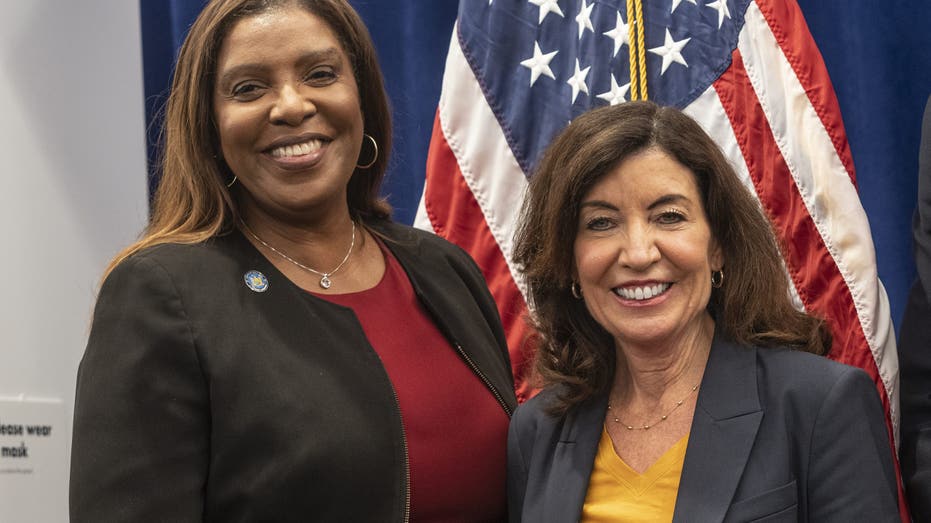New York targets beef producers but can't meet its own climate goals
New York realized (and admitted) it's not on track to meet its “green" goals, but that has not stopped them from trying to enforce those same goals on private companies.

If it weren’t for double standards, Albany Democrats wouldn’t have any standards at all – especially when it comes to "green" energy.
As new reporting shows, New York's renewable energy plans have been decimated, highlighting a disconnect between radical policy proposals and real-world execution.
In 2019, New York state set a whimsical goal of reaching a renewables target of 70% by 2030. But in a new report that serves as a devastating blow to Gov. Kathy Hochul’s agenda, the state now admits they are on track to massively miss that target – and not by a small margin.
New York is on pace to reach just a 44% renewables target by 2030.
US ENERGY FUTURE 'UNDER THREAT' FROM BIDEN POLICIES: GOP REPORT
Hochul’s administration now wants to push the renewables deadline to 2033. Three additional years won’t get them there either.
But New York realizing (and admitting) they’re not on track to meet their "green" goals has not stopped them from trying to enforce those same goals on private companies.
Earlier this year, New York Attorney General Letitia James filed a lawsuit against a beef producer, JBS USA, for allegedly misrepresenting the environmental impact of their production and misleading consumers by claiming that the company would "achieve net zero greenhouse gas emissions by 2040."
NEW YORK CLIMATE LAW DEFINES RITZY COMMUNITIES WITH MILLION-DOLLAR HOMES AS 'DISADVANTAGED'
It’s the height of hypocrisy that the state is now targeting JBS for allegedly misleading consumers for coming up short of that 2040 trajectory while the state itself is also failing to meet their own unattainable goals.
Instead of admitting that the state is guilty of misleading New Yorkers, New York is now coming up with their own excuses as to why they’re failing to meet their objectives.
They’re blaming a variety of factors like "supply chain disruptions" and "geopolitical developments." Another attempted excuse from the state is that developers backed out of contracts amid record high "Bidenflation" and rising costs.
BLUE STATE DELIVERS CRIPPLING BLOW TO GREEN ENERGY DEVELOPMENT, JEOPARDIZING BIDEN'S CLIMATE GOALS
The state expects private companies to meet standards they themselves will not achieve. And instead of recognizing the flaws in the Hochul plan and abandoning the unattainable goals and counterproductive net zero targets, they are doubling down by attempting to enforce them on private companies. They should be embarrassed by their rank hypocrisy.
Further, their failures undermine their credibility to sue others for similar shortcomings, but it also calls into question the practicality of these renewable energy and net zero targets.
If Hochul wants to present a serious energy plan for New Yorkers, it should be based on energy abundance, affordability, choice, innovation, reliability and common sense – not on unattainable, counterproductive goals pushed by radical environmentalists that don’t work in the real world and ultimately hurt New Yorkers.
CLICK HERE TO GET THE OPINION NEWSLETTER
All of this only underscores the need for reliable energy and the need to reverse the state’s ban on the safe extraction of natural gas.
Not only would reversing the ban on natural gas extraction help create more jobs in the Southern Tier, but it would also revitalize communities, drive down energy costs, and provide an abundant source of reliable energy for the entire country.
As these renewable deadlines approach, we can expect Hochul's administration to continue to move the goalposts rather than addressing the underlying problems.
New York policymakers failed to foresee the economic conditions impacting renewable energy’s viability. Ultimately, New York's shifting timelines reflect poorly on the state.
The bottom line: New York's lofty climate goals are little more than political posturing and an embrace of a "rules for thee, but not for me" mindset. Our leaders must make serious course corrections focused on achievable targets, a sincere commitment to sustainable energy practices, and an all-of-the-above approach that strengthens our workers and gives our job creators the best opportunity to succeed.



